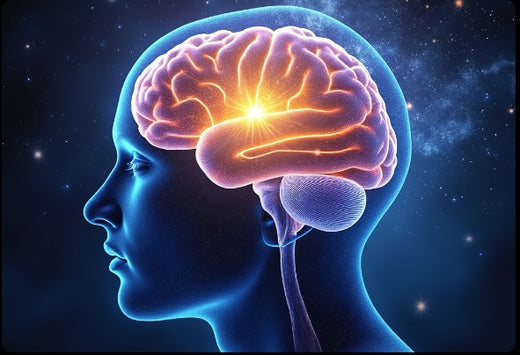Creatine For Brain Health

Creatine is a naturally occurring compound found in small amounts in certain foods and synthesized in the human body. While it's widely known for enhancing athletic performance, research has increasingly shed light on its potential benefits for brain health. Creatine supports cellular energy production, a vital function that is as critical for the brain as it is for muscles.
The Science of Creatine and Brain Health
Creatine is essential for the phosphocreatine energy system, which regenerates adenosine triphosphate (ATP), the body's main energy currency. ATP is crucial for cellular processes, and the brain, as an energy-intensive organ, depends heavily on efficient ATP production.
1) Enhanced Cognitive Performance
Studies suggest that creatine supplementation may improve cognitive performance, particularly in tasks requiring high mental effort. The brain consumes about 20% of the body's total energy, even though it constitutes only about 2% of body weight. In situations where the brain's energy demand increases, such as during intense mental tasks or sleep deprivation, creatine can help maintain optimal cognitive function.
Research has shown that creatine supplementation improves memory and problem-solving abilities in individuals under stress or fatigue. For example, a study found that participants who took creatine performed better on memory and intelligence tests after sleep deprivation than those who did not.
2) Neuroprotection
Creatine’s neuroprotective properties make it a promising supplement for long-term brain health. It may reduce oxidative stress, which is a key contributor to neurodegenerative diseases like Parkinson’s, Alzheimer’s, and Huntington’s disease. By maintaining energy homeostasis, creatine can support neuronal health and prevent cellular damage.
In animal studies, creatine supplementation has been shown to reduce the progression of neurodegenerative conditions. Human trials, though limited, suggest potential benefits in delaying disease onset and improving the quality of life for patients with such conditions.
3) Mood and Mental Health
Creatine may also play a role in improving mood and alleviating symptoms of depression. This is particularly significant because individuals with depression often exhibit abnormalities in brain energy metabolism. Studies have reported that creatine supplementation, when used alongside antidepressant treatments, may enhance therapeutic outcomes by improving energy metabolism in the brain.
Recommended Dosage and Frequency
1) Loading Phase (Optional)
For those who want to increase their creatine stores rapidly, a loading phase is recommended:
- Dosage: 20 grams per day, split into four 5-gram doses.
- Duration: 5-7 days.
This method saturates the muscles and brain with creatine quickly, leading to faster results. However, the loading phase is not mandatory and can be skipped in favor of a steady intake.
2) Maintenance Phase
- Dosage: 3-5 grams per day.
- Frequency: Once daily with water, ideally after a meal to improve absorption.
This dosage is sufficient to maintain elevated creatine levels in the brain and body. Consistency is key for optimal results.
3) Safety and Maximum Duration
Creatine is considered safe for long-term use. Studies have shown no adverse effects from daily supplementation for periods of up to five years. However, periodic breaks (e.g., one month off after 6-12 months of continuous use) may be considered to allow the body to reset its natural creatine production.
Who Can Benefit Most?
Creatine supplementation is particularly beneficial for:
- Athletes and Students: Both groups experience high energy demands, and creatine can aid in maintaining focus, memory, and problem-solving skills under stress.
- Vegetarians and Vegans: Plant-based diets often lack creatine-rich foods, such as meat and fish, leading to lower baseline levels in the body and brain.
- Older Adults: Aging is associated with a natural decline in ATP production. Creatine may help mitigate this decline, supporting memory and cognitive health.
Considerations and Side Effects
Creatine draws water into cells, which can lead to mild dehydration if fluid intake is insufficient. Ensure adequate hydration while supplementing.
Some individuals may experience mild gastrointestinal discomfort during the initial phase of supplementation. To mitigate this, start with a lower dose and gradually increase it over time.
Although creatine is safe for most people, those with kidney conditions or other underlying health issues should consult a healthcare professional before starting supplementation.
Conclusion
Creatine is more than just a supplement for athletes; its potential to support brain health and cognitive function is supported by a growing body of evidence. By enhancing energy metabolism, creatine may improve memory, protect against neurodegeneration, and even support mental health. A daily dose of 3-5 grams is both effective and safe for long-term use, making creatine a valuable addition to a health-conscious lifestyle. For anyone seeking to optimize brain health and energy metabolism, creatine offers a simple, research-backed solution.


Leave a comment